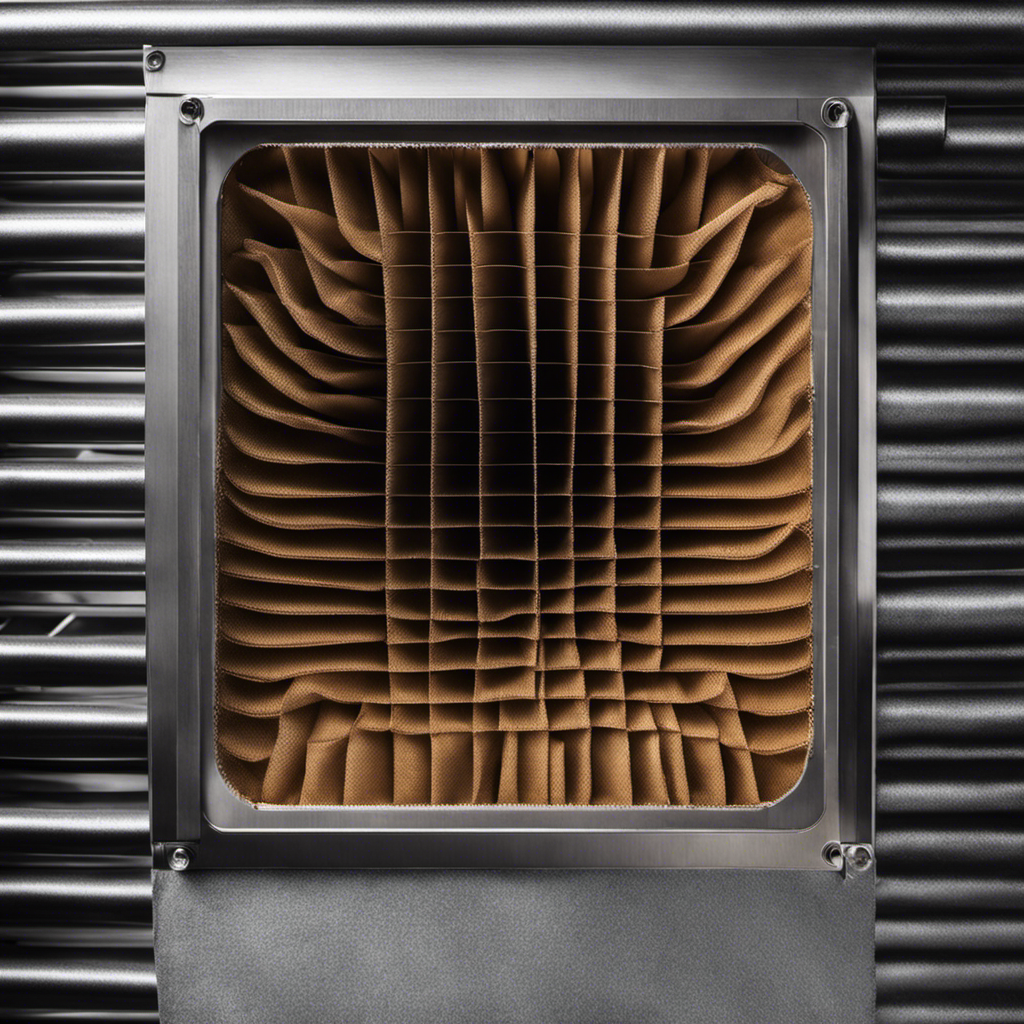In this article, we will explore the potential consequences that can arise when homeowners neglect to change their furnace filters regularly.
By understanding the importance of this simple maintenance task, individuals can ensure optimal heating efficiency, improved indoor air quality, and lower energy consumption.
Moreover, we will delve into the financial implications of failing to replace the filter, including higher utility bills and a reduced lifespan of the furnace.
Prepare to learn how neglecting this essential component can lead to potential damage to your HVAC system.
Key Takeaways
- Decreased heating efficiency and increased wear and tear
- Poor indoor air quality and health risks
- Increased energy consumption and higher utility bills
- Potential system damage and costly repairs
Decreased Heating Efficiency
One consequence of not changing your furnace filter is a significant decrease in heating efficiency. When the furnace filter becomes dirty and clogged with debris, it restricts the airflow, making it harder for warm air to circulate throughout the house.
This reduced airflow results in uneven heating, with some rooms feeling colder than others. In order to compensate for the restricted airflow, the furnace has to work harder and longer to reach the desired temperature, leading to increased wear and tear on the system.
This increased wear not only reduces the lifespan of the furnace but also results in higher energy bills. By regularly changing the furnace filter, you can ensure proper airflow and maintain optimal heating efficiency, providing a comfortable and energy-efficient environment for those you serve.
Poor Indoor Air Quality
Insufficient maintenance of your furnace filter can result in compromised indoor air quality. Neglecting to change your furnace filter regularly can lead to a build-up of dust, dirt, and other pollutants in the air circulating throughout your home.
This can pose significant health risks, especially for those with allergies and respiratory issues. When the air filter becomes clogged, it becomes less effective at trapping and removing allergens, such as pollen, pet dander, and dust mites.
As a result, these allergens can linger in the air, triggering allergic reactions and exacerbating respiratory problems. Individuals with asthma or other respiratory conditions may experience increased symptoms, including coughing, wheezing, and shortness of breath.
To ensure a healthy indoor environment, it is crucial to regularly change your furnace filter to maintain optimal air quality and protect against potential health hazards.
Increased Energy Consumption
Neglecting to change your furnace filter regularly and disregarding its impact on energy efficiency can lead to increased energy consumption.
When the filter becomes clogged with dirt, dust, and other particles, it restricts the airflow and forces your furnace to work harder to maintain the desired temperature. As a result, your energy bills can skyrocket, causing higher maintenance costs in the long run.
Additionally, the increased strain on the system can lead to reduced efficiency and decreased comfort levels in your home. A dirty filter can also cause the furnace to overheat, resulting in potential damage to the unit and costly repairs.
Higher Utility Bills
Failure to regularly change your furnace filter can result in a noticeable increase in your monthly utility bills. When the filter becomes clogged with dust, dirt, and debris, it restricts the airflow in your HVAC system. This causes the system to work harder and consume more energy to maintain the desired temperature in your home. As a result, your utility bills can skyrocket.
Moreover, the accumulation of particles in the filter can lead to higher maintenance costs. A dirty filter can cause your furnace to overheat, potentially damaging the system and requiring costly repairs.
Additionally, a clogged filter can lead to decreased home comfort. Restricted airflow can result in uneven heating or cooling, making certain areas of your home too hot or too cold.
Reduced Lifespan of Furnace
Regularly changing your furnace filter can extend the lifespan of your furnace by up to 10 years. Neglecting this simple maintenance task, however, can have detrimental effects on your furnace’s longevity.
When the filter becomes clogged with dirt, dust, and debris, it restricts airflow and causes the furnace to work harder to heat your home. This increased workload puts unnecessary strain on the system, leading to a shortened lifespan.
Additionally, a dirty filter can lead to a buildup of dirt and grime in other parts of the furnace, requiring more frequent and costly repairs. Furthermore, a dirty filter can contribute to poor indoor air quality, leading to potential health implications for you and your family.
Therefore, to avoid unnecessary maintenance costs and potential health risks, it is crucial to change your furnace filter regularly.
Potential HVAC System Damage
Unfortunately, if you fail to change your furnace filter, it can potentially cause significant damage to your HVAC system. Neglecting to replace the filter regularly can lead to a build-up of dirt, dust, and debris, which can clog the system and restrict airflow. This can put unnecessary strain on the HVAC system, causing it to work harder and less efficiently. Over time, this increased strain can lead to various issues such as overheating, motor failure, or even system breakdown.
Furthermore, a dirty filter can also create potential safety hazards. Restricted airflow can cause the system to overheat, increasing the risk of fire. Additionally, a clogged filter can impact the overall home comfort by reducing the air quality and making the system less effective in maintaining the desired temperature.
It is essential to change the furnace filter regularly to prevent potential damage to your HVAC system and ensure a safe and comfortable living environment.
Frequently Asked Questions
How Often Should I Change My Furnace Filter?
Regular furnace filter maintenance is crucial for optimal performance. Filters should be changed every 1-3 months to ensure clean air, prevent dust buildup, improve energy efficiency, and prolong the lifespan of your furnace. Neglecting filter changes can lead to reduced air quality, decreased efficiency, and potential damage to the furnace.
Can a Dirty Furnace Filter Cause Health Problems?
A dirty furnace filter can lead to respiratory issues and exacerbate allergies. It can trap dust, pollen, and other allergens, circulating them throughout the home, potentially causing discomfort and health problems for occupants.
How Can I Tell if My Furnace Filter Needs to Be Changed?
Regularly checking and changing your furnace filter is crucial for maintaining optimal indoor air quality. Neglecting this task can lead to reduced airflow, decreased energy efficiency, and potential damage to your HVAC system.
Does the Type of Furnace Filter I Use Affect Its Lifespan?
The type of furnace filter used can significantly impact its lifespan. High quality filters, such as HEPA filters, provide better filtration and can last longer. This improves air quality, reduces energy consumption, and extends the life of the HVAC system.
Are There Any Specific Signs or Symptoms That Indicate My Furnace Filter Needs Immediate Attention?
Signs of a clogged furnace filter include reduced airflow, increased energy bills, and poor indoor air quality. Regularly cleaning or replacing the filter not only improves heating efficiency but also prevents damage to the system and potential health issues for occupants.


